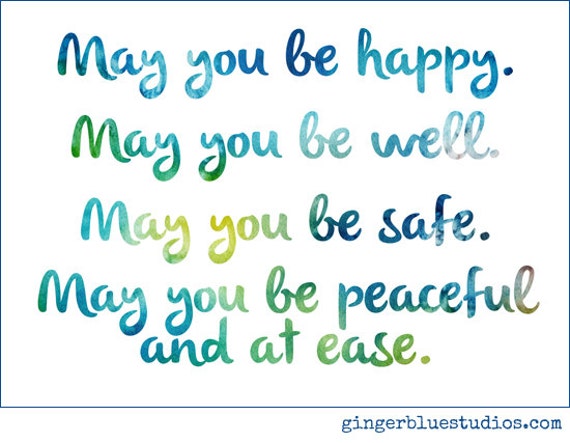
Thankfully, we are in an age of many things – both good and bad, not just “vitriol”. However, besides a good word to throw into a title to get some attention, it is also is what I wanted to blog about.
Having come out of the recent Sangha in which David Clark was able to, nicely and in fairly short order, walk the group through a definition, discussion and practice of Metta, or loving kindness, it seemed all too timely to discuss this practice in the context of the 24 hour vortex of news and discourse that has become our 2016 election cycle.
As referenced during our session on Monday (October 17, 2016), the practice of Metta extends from those we care about to ourselves to those we may have only a passing knowledge of to those we have difficulty with and ultimately to all sentient beings.
I’m good up to the part where we get to people we have difficulty with. I have read a lot about this topic, largely also from Sharon Salzberg, who was the author highlighted during this discussion.
To recap, when it comes to practicing Metta with more difficult people in our lives (friends, family members, co-workers, etc.), it is recommended to first start with those with which we may have more tolerable frustrations as opposed to those with whom we may be involved in much more difficult situations or grievances. (As an example, Donald Trump or Hillary Clinton might first try to send loving kindness first to one of their campaign workers with whom they didn’t get a memo in time and wait a bit to try it on each other – hypothetically speaking, of course.)
This is a real struggle for me and here is why: one of the prevailing ideas around meditation is that we don’t try to hide away the feelings we have, be they pleasurable or difficult. To acknowledge more difficult feelings, such as anger, without attaching, particularly when in the midst of a very upsetting situation, is a huge step, I think. The idea of then ultimately getting to a place where I can also send loving kindness to that same person becomes a stretch.
Thinking about this and wanting to identify with my more “Buddha” nature can cause conflict. After all, shouldn’t one understand that we are responsible for our own interpretation of so called “difficult” people or encounters rather than identify with the feelings that so easily emanate from them?
Well, yes, in theory. And so it was that in listening to the discussion, I really started to question why this seems to be such a difficult proposition. For me, the act of simply responding versus reacting and not wishing harm is a step toward wishing loving kindness for one’s “enemy” if not an act in itself. It is human nature, often deemed as ‘fight or flight’ to either “be killed or kill that which kills you (or is perceived to). Any step away from this more immediate reaction, at least for me, is a testament to a growing practice of both meditation and mindfulness.
Perhaps when it comes to vitriol, difficult people or situations and dealing with hard emotions, this is the work we can do. It simply may not be realistic to practice loving kindness with some people the same way we do with others….and that is ok. As long as directionally we are working toward it, that may be all we can expect and that may be enough at the moment.




